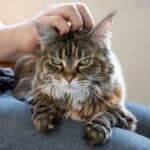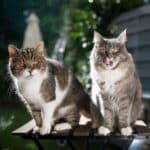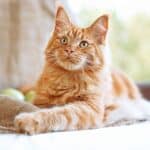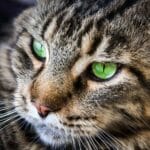The Maine Coon cat is known to be the largest of the feline breed. Due to the breeding, the Maine Coon is the gentle giant of cats.
The average size of a Maine Coon ranges from 8 pounds to 25 pounds. Does this then mean if a cat is smaller than that, you do not have a Maine Coon? There are honestly not many reasons that a Maine Coon is not as large as it should be.
It is very uncommon for a Maine Coon to weigh less than 8 pounds. The first logical reason would be that the cat is not a pure Maine Coon. For the most part, it is statistically impossible to find a purebred Maine Coon under the 8-pound weight mark.
Reasons for small size
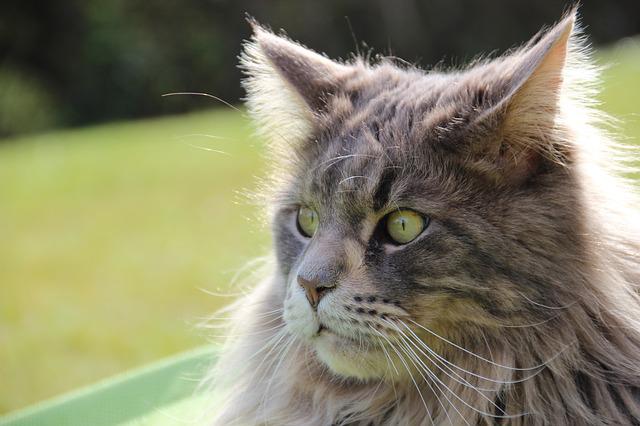
Slow Growth Rate: It must be remembered that the Maine Coon will grow to full size between the 3 and 5-year mark. This is the average amount of time for a Maine Coon to grow to maturity.
Poor Nutrition: The owners may believe that they are spending money on good cat food. The nutrition that is in the food is what is important. Speak with your veterinarian to be sure that you have chosen the type of food that is best for your Maine Coon. You need one that will give the full amount of nutrients the Maine Coon needs to grow to its full potential and be healthy.
Under eating: There could be two reasons that the Maine Coon is not eating enough food. One the cat does not like the food so is not eating the amount the cat should eat. The other possible reason is that the humans are not feeding the Maine Coon the amount of food that is suggested per serving.
Hybrid: This would likely be the most common reason that your Maine Coon. The cat, unbeknownst to the owners, is of a mixed breed.
Hyperthyroidism: Some felines are known to be prone to issues pertaining to the thyroid. In this case, the thyroid is producing too much thyroxine. This is going to keep the cat’s size down because it is unable to gain weight as it should.
Dwarfism: The Maine Coon may have been born with a genetic abnormality.
Small Parents: If both the male Maine Coon and the female Maine coon parents are small sizes, it is doubtful that the offspring is going to be of the normal large size of a Maine Coon cat.
The runt of the Litter: The Maine Coon mother may have a Y-shaped uterus, which will cause the size abnormality.
Taken from mother too soon: Sometimes, the breeders will remove the offspring from the mother cat too soon. This would mean that the kitten did not receive all the necessary nutrition that is needed from the mother. Simply put, the cat lacks the correct amount of nutrition.
Parasites: Whether it is due to the living condition at the home or at the breeder’s, the Maine Coon may have picked up parasites from dirty living or from another infected animal.
Enzyme Deficiency: If the Maine Coon is missing some important enzymes, this could be the main reason that the cat is small. The lack of correct enzymes will cause the cat to be small and also cause other health issues.
Viral or Bacterial infection: If the Maine Coon has a bacterial or Viral infection, this could cause a lack of appetite and likely diarrhoea, These conditions will result in the Maine Coon being unable to grow properly and in a healthy manner.
Cancer: This is a serious health condition and the advice and care of a Veterinarian are necessary immediately.
Portosystemic Shunt: This is a very rare condition that can cause circulatory problems, resulting in the lack of proper growth.
Underlying Illness: There is a possibility that the cat is suffering from another underlying health issue.
Why it may be small
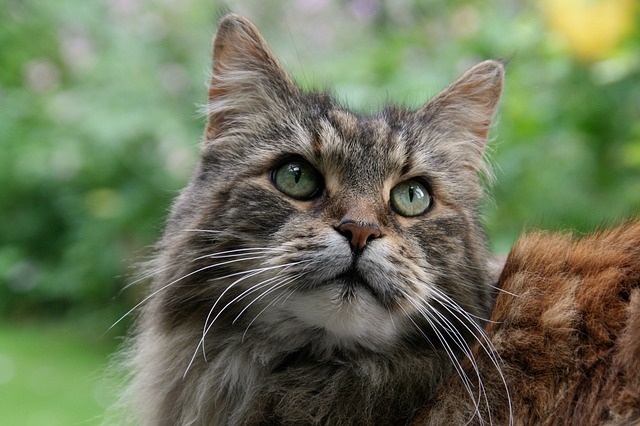
To reiterate all this information, Maine Coons do not grow at the same rate as most other breeds of cats. It will take on average three to five years for the Maine Coon to grow to full maturity.
The nutrition that is given to the cat needs to be balanced and of high quality in order for the Maine Coon to be in optimum health. To explain, if the diet is high in carbohydrates, but low in protein, the cat is not getting adequate nutrition. Along with the lack of proper nutrition, the Maine Coon is not eating enough food in total. You will need to speak with your Maine Coon cat’s veterinarian and determine how many calories the cat should be receiving each meal.
Another possibility is that you did not purchase a full-breed Maine Coon cat. This would mean that somehow, another cat was able to mate with a Maine Coon. One feline parent was of a smaller breed of feline.
Too much Thyroxine is being produced by the Maine Coon cats thyroid. Too much thyroxine means that the metabolism is too high in the cat. Simply explained, this means that your Maine Coon is going to burn through too many calories too quickly. This leads to a seriously underweight cat.
Signs of hyperthyroidism
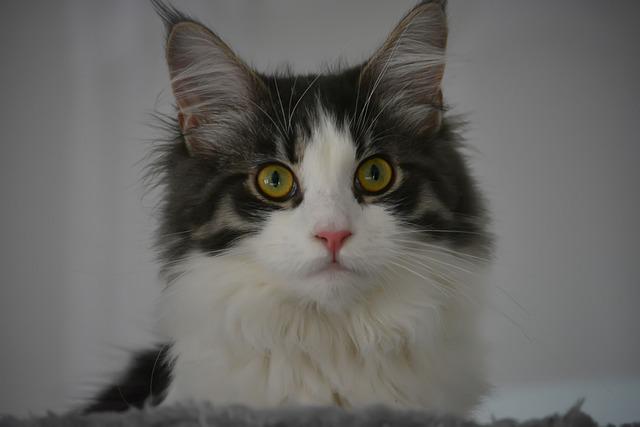
- Vomiting
- Diarrhoea
- Dehydration
- Greasy
- Unkempt fur
Dwarfism is a genetic mutation. This condition is very rare in a Maine Coon, although it has happened. The genetic mutation causes the Maine Coon to be extremely small. Both feline parents were small. This is again, not very likely, however, it could happen that the Mother and the Father were both on the small side, therefore the offspring is smaller. This works in a similar fashion as a human genetics system. Two small parents will likely have offspring that are on the smaller side.
Being the runt of the litter means that the animal is very small versus the other kittens. The mother would likely have a Y-shaped uterus, the kitten developed in the smallest portion of the uterus and therefore came out extremely small, the runt of the litter.
A licensed breeder is usually extremely careful with record-keeping when it comes to dates of birth, weights and so on. However, there may be some breeders who do not follow the suggested regulations of breeding and selling. These certain types of breeders will choose to purposely separate the kittens from the mother as quickly as they can. This will give the breeder a chance to have another litter born quicker.
On average, the registered and licensed breeder will allow the kittens to remain with their mother until the kittens are 8 to 12 weeks old. This ensures that the kitten has received all the nutrition it can from the mother from nursing. When the kitten is removed prematurely, it can lead to stunted growth for the Maine Coon cat.
When a cat or any other animal is stricken with parasites, it will cause the kitten to be unable to grow properly. The parasites can cause illness which would mean that the cat is not able to maintain its weight. Parasites such as ringworm can cause this issue.
When a Maine Coon has an enzyme deficiency, this will lead to a smaller size than an average Maine Coon cat. Other issues or symptoms that can arise from enzyme deficiencies include:
- Neurological problems
- Odd proportions
- Clumsiness
Viral or Bacterial infections can lead to weight loss, or even improper growth rates when it is not detected. Cancer is a diagnosis that only the veterinarian can make. Immediate treatment is needed to help the Maine Coone survive this disease. Portosystemic Shunt is a condition that is rare but is known to cause circulatory problems for the Maine Coon. These problems will likely cause growth problems as well as neurological issues.
Conclusion
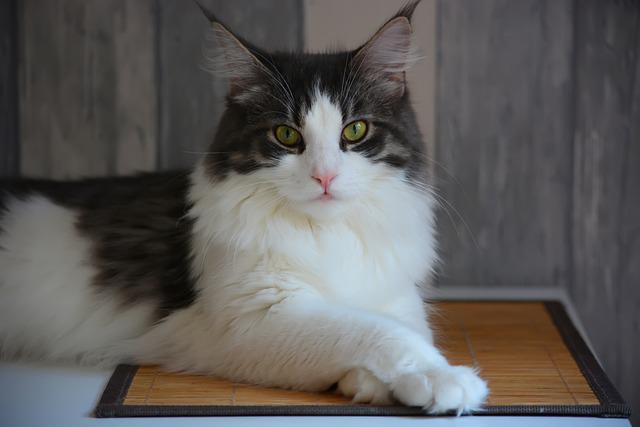
In order to understand how big your Maine Coon could become, you need to know that the average Maine Coon will weigh up to 25 pounds, that is the male, and the female could grow to 8 to 12 pounds. To get a rough estimate of the size your Maine Coon will grow to is to look at the parents, it is a safe bet to assume that your Maine Coon will be pretty close in size to the parents.
There is no way to guarantee how large your Maine Coon cat could become. However, what should be reiterated is that you research and find a local breeder that is licensed, honest and has a great reputation when it comes to Maine Coon cats.
Again, these breeders keep very good records as to the size of the offspring's parents. They will also have records of parentage as far back as when they began as breeders. Ultimately, if you question the breed of your Maine Coon, it is best advised to have genetic testing done. This is the only sure way to tell if the Maine Coon cat that you have is truly a pure Maine Coon or if it was mixed with another breed at some point in time.

